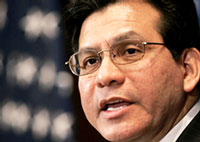ASKIAM
Senior Correspondent
- UPDATE: Gonzales resigns as US attorney-general (Financial Times, 08-27-2007)
- Criminal cronies in high places (FCN, 07-18-2007)

WASHINGTON (FinalCall.com) – Going into mid-summer, U.S. Attorney General Alberto Gonzalez is hanging on to his job, but calls for his removal and the scandals surrounding his tenure are expanding. Meanwhile, the White House has its own problems growing out of Justice Dept. problems, and President George W. Bush appears to be opting for a Constitutional showdown with Congress in an effort to avoid accountability.
“Attorney General Gonzales has shown an apparent reckless disregard for the rule of law and a fundamental lack of respect for the oversight responsibilities of Congress,” said Rep. Jerry Nadler, (D-N.Y.) July 13 in a statement. “The man entrusted with enforcing our nation’s laws must also abide by them, and Mr. Gonzales has apparently failed in that duty.”
To begin with: Mr. Gonzales was given at least a half-dozen reports detailing FBI abuses of power in the three months before he testified before Congress when he sought to renew the Patriot Act. In front of the Senate Intelligence Committee, on April 27, 2005, he claimed he knew of no wrongdoing or abuse of power, and that the Patriot Act was free of problems, despite having personally received reports of numerous violations of the law and FBI protocol.
Mr. Gonzalez has testified untruthfully before Congress, his critics contend. He knew about unauthorized surveillance, improper searches, and other procedural and legal breaches of civil rights and privacy laws, but testified otherwise. Mr. Gonzales was also briefed on the abuse of an anti-terror tool known as the national security letter well before the Justice Department’s inspector general made these violations public.
Then there’s the Constitutional crisis surrounding the firing of eight U.S. Attorneys for what appear to have been purely partisan reasons. Former White House Counsel Harriet Miers faced criminal contempt charges for defying a subpoena from the House Judiciary Committee. Ms. Miers failed to even appear at the first scheduled hearing to answer questions under oath before the panel’s commercial-law subcommittee, which voted that her refusal to testify has no valid legal basis.
Congress’s legal confrontation with the President over his refusal to let aides such as Ms. Miers to testify under oath about White House discussions, is escalating.
There may be a racist, partisan motive at the root of the attorney-firing story. Former Justice Department attorneys have publicly accused the Bush administration of politicizing the department’s Civil Rights Division. The Bush administration has pursued an aggressive legal effort to restrict voter turnout in key battleground states in ways that favor Republican political candidates. The administration did this in part by alleging widespread election fraud in largely Democratic areas and to push new voter ID rules.
Civil rights advocates insist that the administration’s policies were intended to disenfranchise hundreds of thousands of poor and minority voters.
“The heart of the U.S. Attorney scandal was, a plan that apparently goes directly into the White House to suppress minority votes,” Steve Cobble, a Senior Fellow at The Institute for Policy Studies told The Final Call.
“The Republican Party has a long history in the modern era of voter suppression of African American and Latino votes. Going back to William Rehnquist, who became Chief Justice, but first burst on the scene as a lawyer trying to intimidate Latinos out of the voter lines in Arizona in the mid 1960s,” he said.
Since then, “the Republicans have adopted a decades-long strategy of voter-caging, voter-suppression, voter-intimidation, which we saw classically demonstrated in Florida in 2000, and in Ohio in 2004. The root of this Justice Department U.S. Attorney scandal is they were apparently rating the U.S. Attorneys on their willingness to trump up fake voter-fraud cases. And the ones who didn’t faced the wrath of their” local Republican politicians.
Joseph Rich was former head of the Justice Department’s Civil Rights Division until 2005. “This administration is the first administration that I felt had politicized the department to the extent that it has,” Mr. Rich told “Democracy Now!” He had been the head of the Voting Section from 1999 to 2005.
“Well, when I was there through 2005, there was two major things that concerned me the most. The first was, in the voting area, some of the major decisions made were contrary to recommendations from the career people, such as myself, and in my judgment were made for partisan political reasons. These were redistricting decisions in places like Mississippi and Texas. There was a voter ID law in Georgia that was decided just after I left the department in 2005. But in all the years I was there, the Civil Rights Division prided itself on avoiding partisan political decision making and indeed tried to focus just on the legal principles involved.”
U.S. Attorneys were replaced in New Mexico. Missouri and Arkansas under questionable circumstances. “This ties in with the long lines in Columbus, Ohio where there were not enough machines for Black voters. It ties in with the stories of vote switching on the machines. It ties in with the guy who had a long Republican history who was accused of tearing up Democratic voter registrations in Nevada and Oregon. Who was paid huge amounts of money by the National Republican Party,” said Mr. Cobble.












